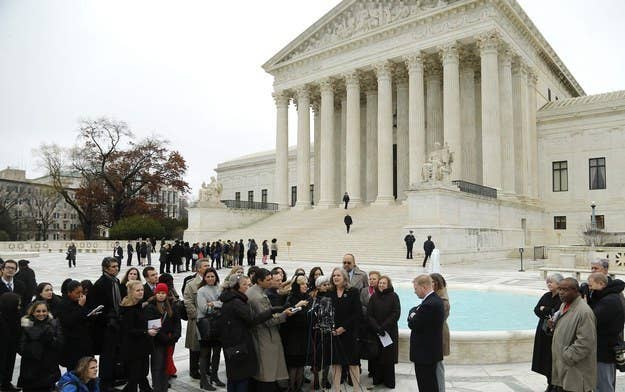
WASHINGTON — Cases from five states are now before the Supreme Court raising the constitutional question of same-sex couples' rights to marry and have their marriages recognized, with cases from two more states on the way and a related request from an eighth state pending there as well.
When the justices declined to review cases out of five states on Oct. 6, they expanded the marriage equality map to include Indiana, Oklahoma, Utah, Wisconsin, and Virginia — with a ripple effect that has extended outward. The justice also might have thought they were delaying the need for them to take up the issue — perhaps into the next year's term, which begins in October 2015.
The 6th Circuit Court of Appeals, however, upheld the marriage and/or marriage-recognition bans in four states — Michigan, Ohio, Kentucky, and Tennessee — later that month, setting up the surge of petitions seeking certiorari that now are back before the court. Same-sex couples from those states filed their Supreme Court petitions in mid-November.
In addition to the 6th Circuit states, plaintiffs in a case challenging Louisiana's marriage ban, who lost at the trial court, have asked the Supreme Court to grant certiorari in their case as well — before the 5th Circuit Court of Appeals has a chance to rule in the case.
What's more, officials in both North Carolina and South Carolina have said that they plan to seek Supreme Court review of their cases before judgment from the 4th Circuit Court of Appeal — which previously struck down Virginia's ban over the summer.
In four of the five states in which petitions and responses have been submitted — all except Tennessee — the states weighed in to agree with the same-sex couples that the court should accept one or more of the cases for review, although all four states differ with the plaintiff couples on whether the bans themselves are constitutional.
In a filing at the court on Monday, however, Tennessee officials broke ranks, telling the justices that "the conflict between the Sixth Circuit and other circuit's does not compel this court's review."
Instead, Tennessee Attorney General Herbert Slatery writes that "certiorari is regularly denied in cases presenting a conflict of decision" — citing a 1990 opinion from former Justice Byron White discussing the point.
Given the timing of the petitions, it is expected that the justices will consider the Michigan, Louisiana, Kentucky, Ohio, and Tennessee petitions at their Jan. 9 conference. If the justices accept one or more marriage cases from that conference, it is expected that it would be heard in the current term — meaning a decision would be expected by late June.
LGBT advocates — along with most states — have been pressing the court to take action in the issue in this term, but the justices themselves will make the final decision as to if and when they will take up the matter.
In the meantime, however, the justices will have to resolve one marriage-related question. On Monday, Florida Attorney General Pam Bondi announced that she was seeking a stay from the Supreme Court in her state's federal marriage case — attempting to keep the trial court order stopping enforcement of the ban from taking effect on Jan. 6. The current stay ends at the end of the day on Jan. 5, and the 11th Circuit Court of Appeals declined to issue any further stay.
Although the justices have denied stay requests attempting to stop same-sex couples from marrying during states' appeals since their October decision denying certiorari in those several states' marriage cases, the Florida request notes, "The Court's recent denials of stays in other marriage lawsuits have arisen from circuits that already decided the ultimate issue." In Florida, in contrast, the 11th Circuit Court of Appeals — where Florida has appealed the trial court ruling — is yet to decide on "the ultimate issue" of whether same-sex couples can be prohibited from marrying.
The Monday filing from Bondi is directed at Justice Clarence Thomas, who can act on the request himself or refer the matter to the full court for review. As of 6 p.m. Monday, a court spokesperson told BuzzFeed News that the request had not yet been docketed with the court.
On Tuesday, Justice Thomas asked for a response to Florida's stay request application by 5 p.m. Thursday.
On Wednesday, Idaho Gov. Butch Otter filed an amicus, or friend-of-the-court, brief urging the court to wait until the Idaho case's petition for certiorari is filed at the court before deciding whether and which marriage case to hear.
On Thursday, parties responded to Florida's stay request application — opposing the request. One group of parties who filed an opposition brief is backed by the ACLU of Florida and national ACLU on behalf of the Grimsley plaintiffs. The other response, also in opposition is filed by Florida attorneys on behalf of the Brenner plaintiffs.
